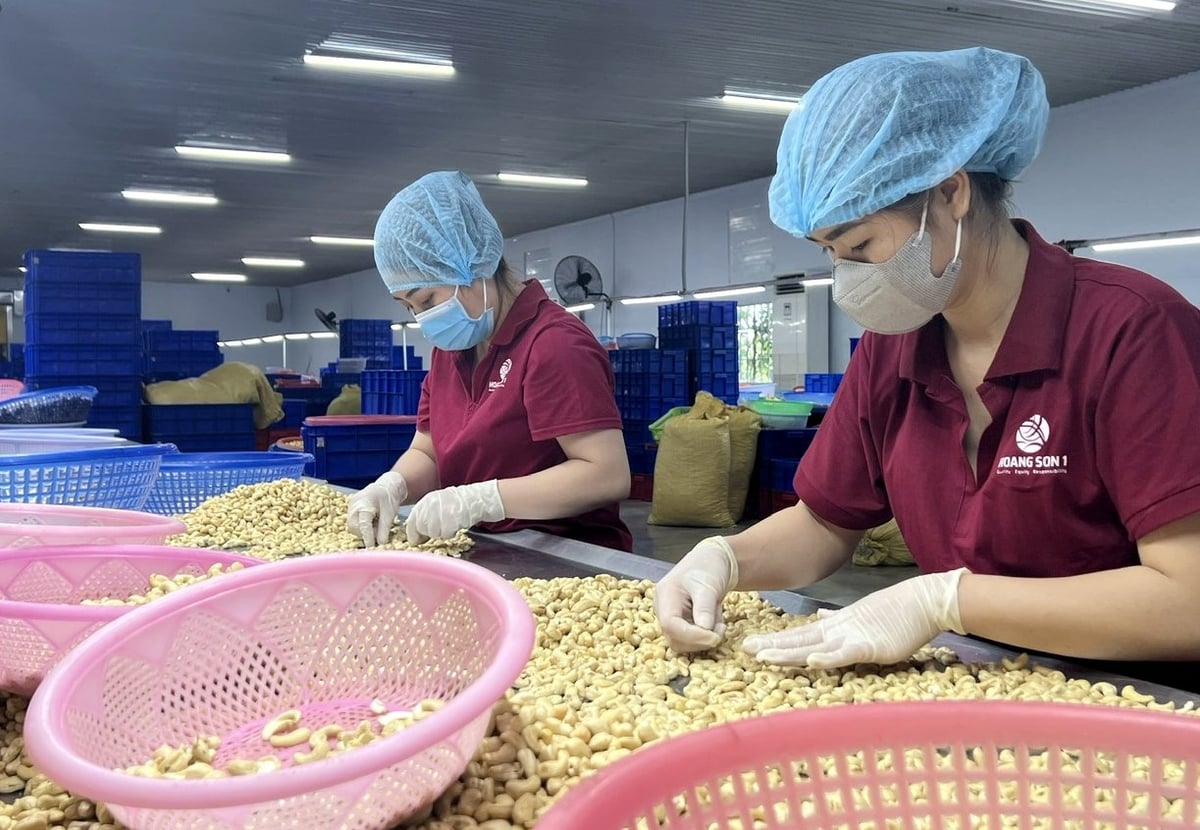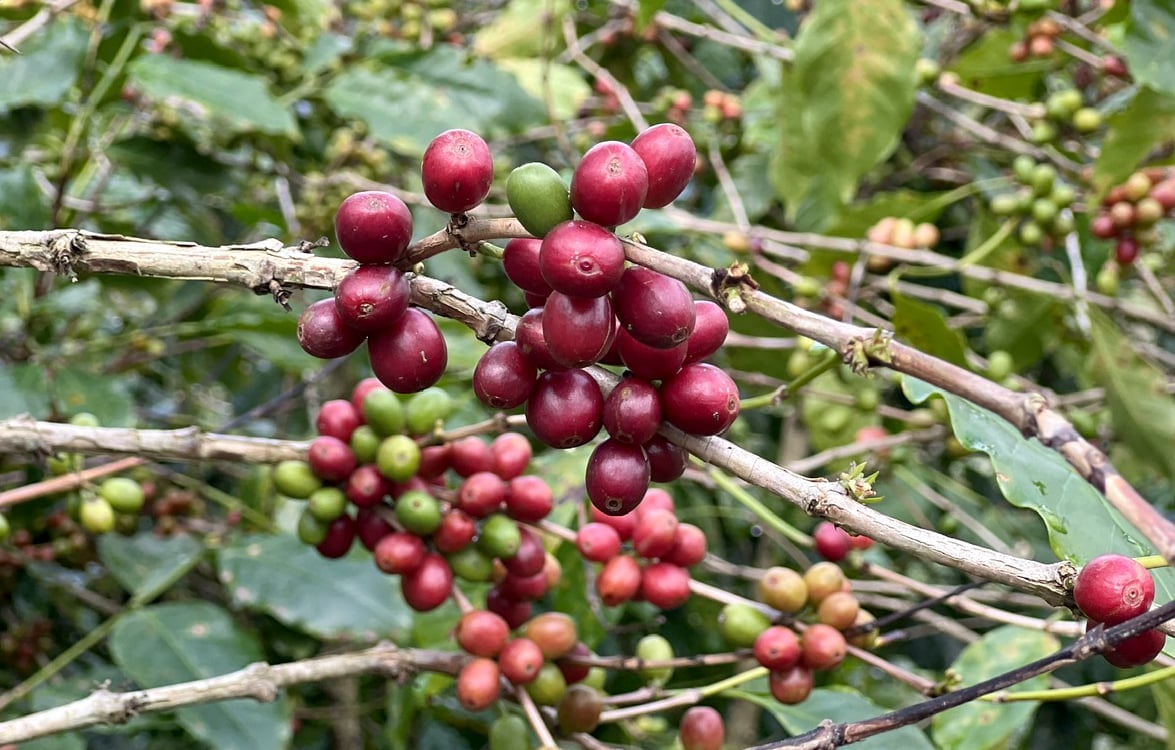November 26, 2025 | 01:52 GMT +7
November 26, 2025 | 01:52 GMT +7
Hotline: 0913.378.918
November 26, 2025 | 01:52 GMT +7
Hotline: 0913.378.918

Cashew nuts are one of the agricultural products that Vietnam can promote for export to the Halal market. Photo: Son Trang.
At the briefing conference with the Vietnamese trade offices abroad, titled "Trade promotion to enhance exploitation of the global Halal product market", organized by the Ministry of Industry and Trade in early April 2025, Mr. Ramlan Bin Osman, Director of the National Halal Certification Center (HALCERT) under the Ministry of Science and Technology, assessed that Vietnam has tremendous potential in agriculture, with a variety of products that could be introduced to Islamic markets worldwide.
Vietnam boasts an abundant and diverse supply of raw materials for the Halal food industry, including coffee, rice, seafood, aquaculture products, spices, various nuts, vegetables, and fruits. This highlights Vietnam’s significant capacity to produce finished products for the Halal market.
In addition, Vietnam’s recognition as one of the top international tourist destinations in 2018 further highlights its potential for strong growth in the hospitality industry. This includes the development of Halal restaurants and catering services.
Especially, the 20 agricultural products that are most imported by countries in the Organization of Islamic Cooperation (OIC) are all being produced and exported by Vietnam. These 20 products include: green coffee beans, milled rice, cashew nuts, black pepper, fresh fruits, coffee extracts, processed foods, roasted coffee, dried cassava, various nuts, processed fruits, cakes, tea, sugar confectionery, animal feed, natural honey, cinnamon, non-alcoholic beverages, wheat flour, and fruit juices.
With such a broad range of key agricultural products, the Halal market holds a significant position for Vietnam’s export strategy. Mr. Tran Van Hiep, Vice Chairman of the Vietnam Cashew Association, highlighted that from 2022 to 2024, the export of cashews to the Middle East region has consistently reached approximately 400 million USD annually, with over 60 thousand tons of cashew kernels being shipped out each year. During this period, the Middle East market accounted for between 8 and 13% of Vietnam's total cashew exports. In 2024, markets in the Middle East, including the UAE, Turkey, Saudi Arabia, Iraq, Jordan, Iran, and Egypt, are expected to import Vietnamese cashews worth tens of millions of USD.

Vietnamese coffee has a great opportunity to enter the Halal market. Photo: Son Trang.
In 2024, many Vietnamese agricultural products, such as rice, coffee, cashew nuts, and black pepper, have shown remarkable growth in exports. Mr. Ramlan Bin Osman emphasized that if these products are produced according to Halal standards, they could significantly deepen their presence in Muslim markets.
Given the vast potential of Vietnam’s agriculture, Mr. Ramlan Bin Osman pointed out that the country has a huge opportunity to enter the global Halal food market. This market, which is currently valued at 3 trillion USD, still faces a considerable gap between supply and demand for Halal products, meaning there is significant room for expansion.
Therefore, to seize this opportunity and fully harness its potential, Vietnam needs to learn from the experiences of leading Halal food-exporting countries and establish a strong Halal ecosystem. This would enable Vietnam to soon become one of the world’s leading producers and suppliers of Halal food.
In fact, many countries around the world, despite not being Islamic nations, have achieved great success in the global Halal food market because they recognized the immense potential and opportunities of this market long ago.
Australia, for instance, is currently the largest exporter of beef to Middle Eastern countries, while Brazil stands as the largest supplier of Halal poultry to the region. Japan, recognizing the significance of the Halal market, has identified it as a key contributor to its economy, with the 2020 Summer Olympics acting as a major catalyst in promoting Halal products. South Korea has also set ambitious goals, aiming to become one of the leading tourist destinations for Muslim travelers.
In Southeast Asia, Thailand, which has a relatively low Muslim population, has successfully built a strong Halal economy. Through strategic investments and policies, Thailand has become one of the largest global producers of processed Halal food. The country has branded itself as the "Kitchen of the world".
Vietnam’s potential to expand Halal exports is further underscored by its position among the world’s top 20 food-exporting countries and as one of the 15 largest agricultural exporters globally. In addition, Vietnam plays a vital role in global supply chains, having signed 17 free trade agreements (FTAs), including several new-generation, regional, and inter-regional FTAs.
Translated by Phuong Linh

(VAN) An Giang promotes supply-demand connections, standardizes quality and builds value chains, creating a foundation for sustainable bird’s nest development and aiming to expand exports.
/2025/11/24/5339-4-nongnghiep-075331.jpg)
(VAN) Recently, the conference on 'Sustainable Fisheries Linkage Chain - Tilapia for Export' took place in Tien Hai commune, Hung Yen province.
/2025/11/21/4309-2-153400_128.jpg)
(VAN) Green and low-emission rice is paving the way for Vietnamese rice to enter high-end markets, marking the beginning of a transformation journey toward greening and elevating the national rice brand.

(VAN) ‘Right to Win’ outlines a national action plan that shapes a new vision for Viet Nam’s agriculture in an era of renewal and global integration.

(VAN) Lam Dong’s farmed sturgeon output this year is expected to reach 2,300 tons, worth VND 450 billion, affirming the brand’s position on the market.

(VAN) A surge in Ukrainian egg exports, largely driven by soaring sales to the UK over the last few years, has notably pushed up egg prices on the domestic market.

(VAN) The price of Arabica Catimor coffee in Quang Tri is currently at VND 25,000–27,000/kg (fresh cherries), the highest level ever recorded